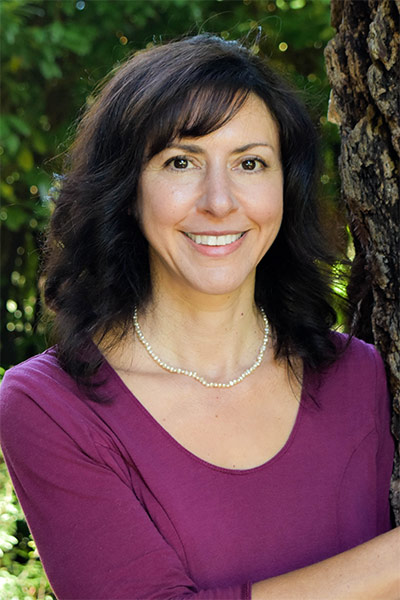Forty-eight hours after Dyane Harwood gave birth in 2007 she found herself obsessed with writing, a condition called hypergraphia.
She’d write day and night, bending over her computer even as she breastfed her newborn, Marilla, and her toddler, Avonlea. She felt full of creativity. Her thoughts raced.
What Harwood (Cowell ’91, English and American literature) would discover six weeks later was that her mania and compulsive writing were symptoms of something called postpartum bipolar disorder.
It’s a rare condition — one or two cases per 1,000 live births, according to studies — and it set Harwood off on a years-long search for help that included hospitalizations and electroconvulsive therapy. Eventually, she was able to manage her illness, but along the way she also became an advocate for awareness of the disorder.
October 10, Harwood’s memoir, Birth of New Brain: Healing from Postpartum Bipolar Disorder, will be released by Post Hill Press.
Says Devon Brown, a spokeswoman for the independent publisher distributed by Simon & Schuster: “We hope that by helping Dyane share her personal journey with postpartum bipolar disorder, we can raise awareness and help anyone who may be struggling with postpartum mental illness.”
Harwood sits at her kitchen table, a view of redwood forest out the front window of her Ben Lomond home. She wears jeans and a tank top, and her long, dark hair is pulled off her face. She grew up in the shadow of bipolar disorder, she says.
According to her, her father, a brilliant violinist named Richard Leshin who graduated from Juilliard and was a Fulbright scholar, played with the Los Angeles Philharmonic for nearly four decades. But beneath the veneer of talent was a man whose moods ranged from steep highs to deep lows. In his manic phases, Harwood says, her father would party into the night and go on spending sprees, including once bidding $30,000 at auction for a violin he couldn’t afford. Sometimes, he would wind up in psychiatric hospitals, where, Harwood says, she felt the shame of mental illness when she came to visit.
Harwood fled north to UC Santa Cruz, where she studied with professors Michael Warren and Page Stegner and with writer and playwright Kathryn Chetkovich and had dreams of becoming a writer. She married Craig Harwood, a geologist and a 1987 Cowell graduate, and worked at a variety of jobs: substitute teacher, special events coordinator, personal trainer, and, eventually, writing for Friends of Santa Cruz State Parks.
When her first child was born, Harwood had a flush of manic energy, but it quickly subsided. Then, her second daughter was born.
Harwood leans forward across the table as she tells the story of feeling so full of energy she was unable to sleep, of the flurry of words that fell from her mouth and her fingers, of the feeling of intense creativity.
She knew something was wrong but wasn’t sure what it was until her doctor mentioned her apparent mania and she told the physician about her father’s bipolar disorder.
“I wound up being the very thing I looked down upon,” Harwood says.
A short time later, she got into an argument with her husband.
“I started screaming at him and chasing him around the house. I punched him. It was the only violence in our 17 years together,” Harwood says.
Immediately, she checked herself into a psychiatric hospital, beginning what would be years of looking for a way to manage the illness. She also decided not to be quiet about her disorder.
A year after her diagnosis, Harwood formed the Santa Cruz County Chapter of the Depression and Bipolar Support Alliance, facilitating free support groups for women with mood disorders in Santa Cruz and the San Lorenzo Valley. She was interviewed by local newspapers and wrote articles about postpartum-onset bipolar disorder that appeared in the Huffington Post and SELF magazine. She believes her family history, sleep disruption, and hormones played a role in the onset of her illness and that “so much could have been prevented if only my doctor (obstetrician) had asked me if I had a family history of bipolar disorder earlier.”
One important change that needs to be made, she says, is a mental health screening for women who are pregnant.
As her Scottish collie named Lucy barks from the backyard, Harwood says her disorder is under control with a combination of therapy and therapeutic drugs — lithium and a monoamine oxidase inhibitor — and that her children ask her about the possibility of them suffering the same illness.
“I tell them that, statistically, the chances are low,” Harwood says, “but even if you do have it, we know what to do.”


